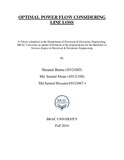Optimal power flow considering line loss
Abstract
The main objectives of the optimization of electric energy systems are to meet load demands with adequacy and reliability and to keep it at the same time economical, meaning to keep the prices as low as possible. Electric energy demand has been shown to be an exponential function doubling its rate over every decade. This ever-increasing load has led to larger and more complex systems. Interconnections throughout the whole country is growing and expanding. The main advantages of such interconnections are continuity of service and economy of power production. Power interchanges between interconnected systems are scheduled to take advantage of hour apart peak demand periods or available lower cost capacity. During emergencies, spinning reserve capacity is shared, contributing to the continuity of service. This extensive interconnection of large scale power systems has resulted in the formulation of many new concepts in power system planning and operation. The gradient and Newton methods of solving an OPF suffer from the difficulty in handling inequality constraints. Linear programming, however, is very adept at handling inequality constraints, as long as the problem to be solved is such that it can be linearized without loss of accuracy. We will include transmission losses in our OPF analysis and also implement it in MATLAB.

